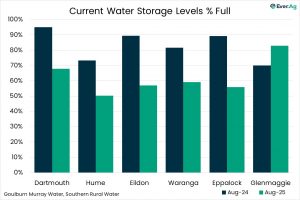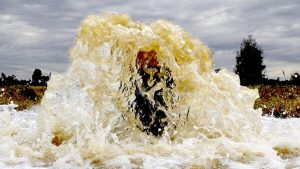
The whole industry would be severely impacted by an outbreak of either disease, with reduced international trade, even if dairy businesses are not directly affected. Preparedness and response plans to these diseases are being developed, with the dairy industry heavily involved.
A quick response gives the best chance of eradication. Report any unusual signs in your cows to the Emergency Animal Disease Hotline – 1800 675 888
What are the risks?
Two Emergency Animal Diseases, Lumpy Skin Disease (LSD) and Foot and Mouth Disease (FMD), have been found in Indonesia, increasing the risk of an outbreak in Australia. An outbreak of either disease would cost the Australian dairy industry billions in loss of international trade, the cost of the response, and the potential loss of cattle culled. Even if no dairy farms are directly infected, all dairy and cattle trade will be impacted by international market loss.
What are the diseases?
LSD is a cattle disease (including buffalo), mostly transmitted by biting insects. This causes skin sores, reduced milk production, fever and abortion. This disease is most likely to come into Australia by insects blown across to Northern Australia on monsoon winds.
FMD is a disease affecting ruminants (cattle, goats, sheep), pigs and camelids (camels, alpacas). It causes sores in the mouth and feet, as well as teats. This disease is more likely to be bought into Australia by the illegal importation of infected meat products or contaminated clothing or shoes.
What is the industry doing?
To address these risks, the Commonwealth, State and Territory Governments, along with affected industries, are working together to prevent and prepare for an incursion.
Dairy Australia and Australian Dairy Farmers are both members of Animal Health Australia (AHA), and are heavily involved in the current revisions of the AUSVETPLAN manuals for both these diseases. Managed by AHA, AUSVETPLAN documents provide a nationally agreed approach for the response to an emergency animal disease, and the dairy industry is working hard to ensure these agreed approaches account for dairy production systems.
Focusing on addressing the current LSD outbreak in Indonesia, the Red Meat Advisory Council is coordinating work to ensure all cattle industries, including dairy, have input into Government plans and enable collaboration on any research needed. This work is split into key areas, including overseas in-country support, trade, diagnostic capability and vaccine development, domestic containment and communications. The dairy industry is represented in all groups.
What can farmers do?
While the risk of one of these diseases coming on to your farm may seem remote, excellent biosecurity and surveillance by farmers is our industry’s best protection. Japanese Encephalitis, a disease spread by biting insects which affects pigs and humans, was found only first in the Riverina district of NSW and northern Victoria, when the incursion is most likely to have come in via northern Australia.
If you see anything unusual, such as sores, fevers, sudden drops in milk production or cows isolating themselves, speak to your vet, government vet, or contact the Emergency Animal Disease Hotline on 1800 675 888. Finding the disease early gives us the best chance of eradication, and any stock culls are eligible for compensation.
Good biosecurity practices are also vital to reduce the spread of diseases and are particularly important for FMD. Keeping track of visitors, quarantining new stock, and ensuring gear used on multiple farms (e.g. disbudding irons) is cleaned before use is a good starting place in preventing any disease spread.

























